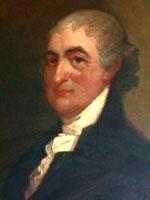Federalists in the House and Senate voted against war-related measures an astonishing 90 percent of the time.
“The overwhelming calamity—so much dreaded by many—so little expected by the community at large—but so long considered inevitable by a few—has befallen OUR COUNTRY.” Columbian Sentinel, Massachusetts, June 24th, 1812.

Public Domain. Henry Sandham (1842-1910).
Federalists in the House and Senate voted against war-related measures an astonishing 90 percent of the time. Why did the Federalists oppose the War of 1812 so vehemently?
Many viewed the whole conflict as an unnecessary one, manufactured by James Madison and his Republican Party to further their own political interests. Rufus King, Federalist Senator and Minister to Great Britain, stated that he “regarded the war, as a war of party and not of country.” That perspective became particularly intense among Federalists after a series of destructive riots in Baltimore during the summer of 1812. Federalists believed the violence there was specifically aimed at intimidating those who challenged President Madison’s war declaration.
In addition, Federalists often disagreed with the president’s wartime strategy. Many in the party believed the war should be restricted to clashes on the high seas rather than campaigns on land. Federalists generally opposed the Republican strategy of invading Canada, believing it would result in disaster for America. And party members disagreed with Republicans’ decision to target Britain while rejecting the opportunity to confront France. That part of the Republican strategy was particularly vexing, since many Federalists believed the nation’s real enemy was Napoleon, described by one party member as the “arch-Fiend who has long been the curse and Scourge of the European World.”
Although Federalist opposition to the war could be found throughout the nation, it was most intense in New England. By 1814, Federalists there were eager to bring the conflict to an end. But Madison held fast, unwilling to make any concessions to the British. It appeared to some New Englanders that the war might drag on for several more years. With British forces occupying parts of coastal Maine and devastating the coastal commerce so vital to their maritime economies, New England Federalists saw themselves as shouldering an unfair share of the war’s burdens.
Leading Federalists in New England believed that the best way to register their displeasure with the conflict was to oppose it visibly and vigorously. When New England’s ranking general Henry Dearborn tried to call out companies of state militia to support an offensive into Canada, the governors of Connecticut, Rhode Island and Massachusetts refused to provide the requested troops, arguing that militia could only be provided for defense against invasion.
Ultimately, New England Federalists became so angered at the prosecution of the war that they staged a meeting at Hertford, Connecticut, in the winter of 1814-15. That meeting, which became known as the Hartford Convention, provided Federalist delegates with the opportunity to air their grievances and discuss responses to the Republicans’ leadership. One of the remedies proposed at the convention, New England’s secession from the Union, struck many as extreme—but from the perspective of some radical Federalists, the president’s war invited discussion of such a drastic solution.
Last updated: March 22, 2016
